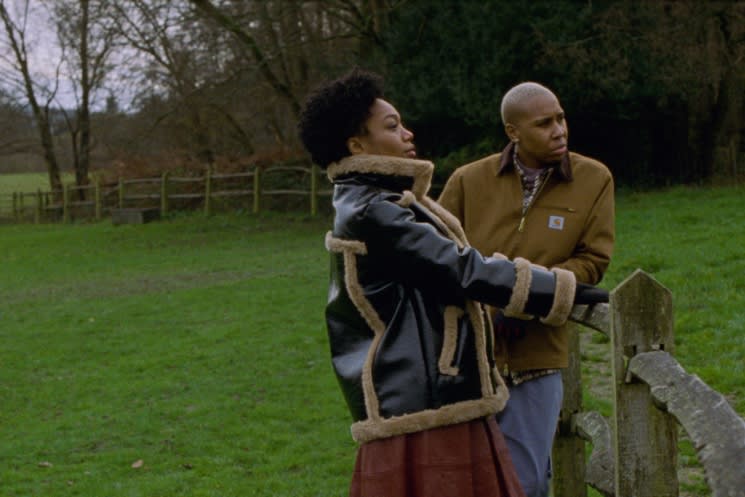When Master of None announced that it would be returning following the 2018 sexual misconduct allegations against Aziz Ansari, it seemed that the show was left with two equally dubious options: either become some sort of a self-congratulatory mea culpa in which Ansari's character Dev grapples with the #MeToo movement, or he ignores the subject entirely and carries on giggling, making pasta and looking for love with the same breezy rom-com tone.
Savvily, the show takes the unexpected third path by shifting the attention away from Dev, mostly keeping Ansari behind the camera rather than in front of it, and pivoting instead to his friend Denise (Lena Waithe). It's not just marketing: an Emmy-winning second season episode focusing on Denise was the show's best yet, so it seems entirely likely that this would have been the third season plan regardless of what happened in Ansari's personal life. Waithe and Ansari co-wrote the entire season, reprising their collaboration from the aforementioned standout episode.
The season is slow. Like, really slow: the first 90 seconds of the season are a single shot of Denise and her wife Alicia (Naomi Ackie) waking up in bed. After that, Alicia goes jogging. They dance for two minutes while unloading the dryer. They smoke a joint in bed. It's as cozy and boring as actual life during lockdown (which is possibly alluded to at one point, but it's not fully clear if this is taking place during the pandemic).
The season is subtitled Moments in Love, and it offers just that: a look at the highs and lows of a long-term relationship. A brief appearance from Dev and his girlfriend confirms the show's cynical view of love, as the couple turn a cozy dinner party into a massive fight that pulls at the frayed ends of their relationship.
Master of None takes the Before Sunrise/Sunset/Midnight approach to filmmaking, with long scenes dominated by conversation rather than action. There's almost no music, save for one scene where the score completely drowns out the talking. Nearly all of it is filmed in stationary shots, with the camera situated far away from the characters and acting as a fly on the wall for their most private moments — the boring as well as the dramatic. An entire episode is devoted to the dehumanizing bureaucracy of the medical system. It's so intensely minimal that it's almost confrontational, as if it's trying to teach its audience new viewing habits (and possibly daring Netflix viewers with low attention spans to switch to something else).
It's so pointedly pretentious and conceptual that it's quite charming, like a drone musician who spends an hour onstage just twiddling around with effects pedals, and fuck you if you're bored. In a making-of featurette, Ansari admitted that this season "sounds like a terrible idea." On film, though, it mostly works.
(Netflix)Savvily, the show takes the unexpected third path by shifting the attention away from Dev, mostly keeping Ansari behind the camera rather than in front of it, and pivoting instead to his friend Denise (Lena Waithe). It's not just marketing: an Emmy-winning second season episode focusing on Denise was the show's best yet, so it seems entirely likely that this would have been the third season plan regardless of what happened in Ansari's personal life. Waithe and Ansari co-wrote the entire season, reprising their collaboration from the aforementioned standout episode.
The season is slow. Like, really slow: the first 90 seconds of the season are a single shot of Denise and her wife Alicia (Naomi Ackie) waking up in bed. After that, Alicia goes jogging. They dance for two minutes while unloading the dryer. They smoke a joint in bed. It's as cozy and boring as actual life during lockdown (which is possibly alluded to at one point, but it's not fully clear if this is taking place during the pandemic).
The season is subtitled Moments in Love, and it offers just that: a look at the highs and lows of a long-term relationship. A brief appearance from Dev and his girlfriend confirms the show's cynical view of love, as the couple turn a cozy dinner party into a massive fight that pulls at the frayed ends of their relationship.
Master of None takes the Before Sunrise/Sunset/Midnight approach to filmmaking, with long scenes dominated by conversation rather than action. There's almost no music, save for one scene where the score completely drowns out the talking. Nearly all of it is filmed in stationary shots, with the camera situated far away from the characters and acting as a fly on the wall for their most private moments — the boring as well as the dramatic. An entire episode is devoted to the dehumanizing bureaucracy of the medical system. It's so intensely minimal that it's almost confrontational, as if it's trying to teach its audience new viewing habits (and possibly daring Netflix viewers with low attention spans to switch to something else).
It's so pointedly pretentious and conceptual that it's quite charming, like a drone musician who spends an hour onstage just twiddling around with effects pedals, and fuck you if you're bored. In a making-of featurette, Ansari admitted that this season "sounds like a terrible idea." On film, though, it mostly works.
